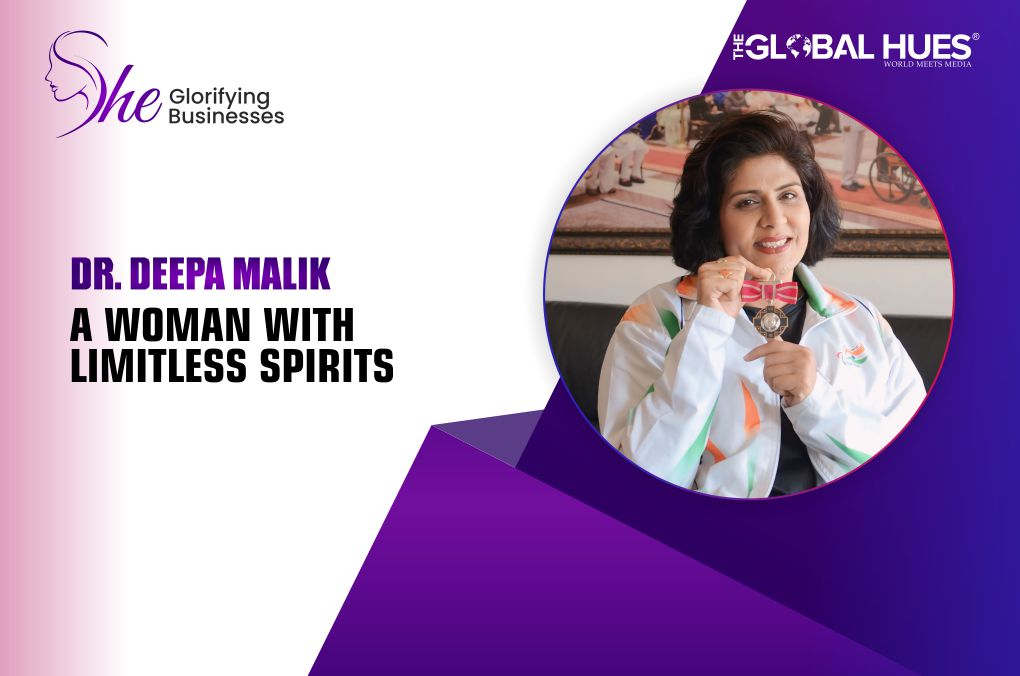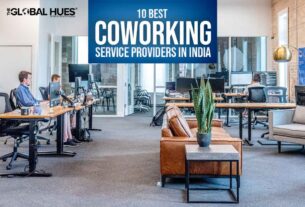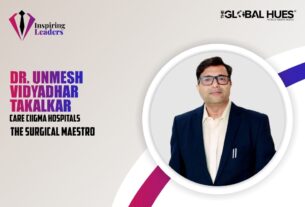Empowering the spirit, and overcoming the odds – that’s the journey of a true warrior. As the first Indian woman to win a medal in Paralympic Games, Deepa Malik has defied limitations and shattered stereotypes. Beyond her achievements in sports, she is a pioneer – a paraplegic Indian woman biker, a swimmer, a car rallyist, an entrepreneur, a social activist, a motivational speaker, and an independent Director. A proud recipient of many prestigious awards such as the Padma Shri, Rajiv Gandhi Khel Ratna Award, Arjuna Award, President’s ‘First Ladies’ Award, Karamaveer Chakra Award, and many more. The story of Deepa Malik can give goosebumps.
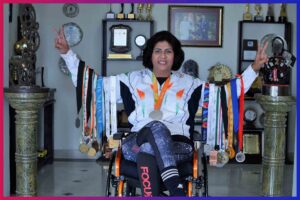
She has won twenty-three international and sixty-eight national and state-level medals in swimming, javelin, shotput and discus events. She is recognised as one of the ten most inspirational para-athletes in the world. Dr. Deepa etched her name in history by becoming the only Indian woman athlete ever to win medals in three consecutive Asian Games while maintaining the Asian Record in Javelin throw consistently.
She also swam 1 km against the current across the Yamuna River, setting a world record in open river swimming. She is the first woman in India to receive the International Women’s Day Recognition by the International Paralympic Committee, and the ‘Asian Order’ by the Asian Paralympic Committee to honour her contribution in promoting para-sports for persons with disabilities. Her awards list stands endless.
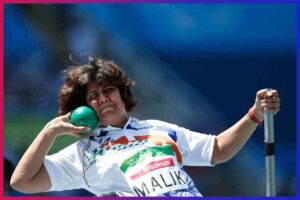
The Global Hues connected with Dr. Deepa Malik to talk about her achievements, how the Paralympics evolved over the years and how we can build an inclusive society.
Share the highlights of your contributions in 2023, especially in your leadership role in the Paralympic Committee.
In 2023, I was engrossed in many purposeful activities, like being in the leadership role of the Paralympic Committee of India as the first Para-athlete woman to be chosen to head the Paralympic Committee as President. This committee has given me everything, from giving me a platform to showcase my potential and abilities beyond my disabilities to allowing me to demand and then become a part of the change. Last year, I actively contributed to planning India’s participation at the Paris 2024 Paralympics and Hangzhou Asian Para Games 2023.
During the year, as part of the committee, we made efforts to introduce International courses & sports science programs for para sports. The Target Olympics podium schemes saw the maximum number of para-athletes. 2023 also brought home 111 medals from the Asian Para Games, where 40% of medals were contributed by women para-athletes, showcasing a substantial rise in women’s participation in para sports.
I extended my impact by joining the Divyang Board Advisory Committee of the Uttar Pradesh government and actively participating as a Nikshay Mitra in the TB Mukht Bharat initiative. Additionally, I pursued further education and completed the Director’s course from the Indian Institute of Corporate Affairs. This led me to enter the corporate world as an Independent Director because having a Woman independent director has become a mandate under the Company’s Act. This move allowed me to use my experience and contribute meaningfully to the corporate sector.
How has the Paralympics evolved over the years? What advancements or developments do you envision for aspiring athletes at this stage?
The change has been tremendous. We are fortunate to have a government and Prime Minister who actively engages with Para-athletes and takes accountability for para sports firsthand, from getting involved in their training, meeting and receiving their family members, to wishing them good luck before leaving and calling them after winning every medal to celebrate. The policies have become more inclusive. On 2nd October, the honourable Prime Minister inaugurated a 34-acre excellence para sports centre at Gwalior. States like Assam and Uttar Pradesh have also revised their policies for para sports. We are witnessing a positive shift at the state level.
The Purple Fest (India’s First-of-its-kind inclusive festival that celebrates persons with disabilities) has grown by leaps and bounds. This year, the Paralympic Committee has become a part of it. There has been enormous growth in para-sports. The number of Asian and World records that Indian Para-athletes are making showcases the impact of excellent policies, governance, involvement of sports sciences, correct nutrition, mental well-being, and the integration of cutting-edge world technology for prosthetics.
Many mainstream corporates are coming in and supporting para sports. Para sports has received huge title sponsorships from PSUs, the Indian Oil Corporation, and the SBI Foundation. My advice to aspiring athletes is to seize this opportunity as a once-in-a-lifetime chance. India is on the cusp of becoming a sporting nation, bringing forth new job opportunities, improved treatment for Paralympic sports, and substantial awards and cash rewards that can shape para-athletes’ careers.
The scope of job opportunities isn’t limited to being an athlete. Para-athletes can become classifiers or do basic coaching programs. It is the best time for people with disabilities to explore the world of Para sports.
Can you shed light on the international developments as well? Concerning the Paralympics and opportunities ahead, are there any initiatives at the school level?
Another highlight for me in 2023 was the introduction of the Khelo India Para Games, as there have been six to seven episodes of Khelo India. At first, there was no age limit, but I’m working hard to bring back junior and sub-junior para sports.
I am encouraging children to join sports at a young age. Para sports is still in its nascent stage, and we are taking steps to create policies, state-level plans, end-to-end inclusive infrastructure, coaches, and inclusive facilities to build people’s confidence in the system. We need more coaches and classifiers. I am reaching out to Kendriya Vidyalaya Sangthan to educate their physical education teachers for para sports.
I believe that education has to become inclusive. Young disabled children should be encouraged to play sports. With 80% of our country residing in rural areas, the performances and role models have helped village and district-level panchayats realise that para sports is an enormous medium that is not only empowering people with disability but also changing the mindset of society as a whole. It is a slow and steady progress, and there is still scope for improvement.
If I talk about challenges, they are the same all around the globe. I have been associated with para sports since 2006 and have seen the tremendous growth of para sports at the international level. Para sports have evolved, redefining categories with disability classifications and reviews for enhanced clarity and fair play transparency. Initial methods for determining disability visibility have been replaced with nerve-ending tests and MRI tests are in place to assess muscle charter and function. For visually impaired athletes, machine testing and computers are now employed to test their eyesight. With the emphasis on anti-doping, athletes are tested regularly, even if they are para-athletes.
Para sports is no longer a recreational sport but a competitive sport now. Train the trainer programs are also becoming popular. We are seeing a surge in International competitions and Grand Prix Events. The number of events, participation, and countries’ participation has also increased. For instance, in the first edition of the Asian Para Games, we won only 14 medals and participated barely in five different sports. In Korea, we won 33 medals. In Indonesia, we won 72 medals, and recently, in Hangzhou, China, we won 111 medals and participated in 17 sports, out of which 16 sports saw women’s participation, and the 17th was for male-blind football. The transformation is happening globally, and the world records are at par with non-disabled athletes. Overall, the competition standards and the magnitude of the para sport are tremendously increasing and will continue to rise in the future.
Your journey has been full of tornados and challenges. How did you stay strong and keep going forward during those hard times?
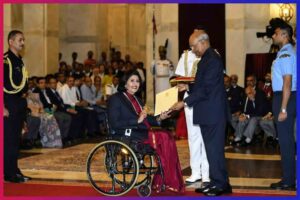
My life’s purpose was very strong. It started with motherhood. I was the mother of two kids when I got paralysed below the chest. During that time, my elder daughter was going through her own challenges due to her head injury, which had left the left side of her body paralysed. She was recovering from ‘hemiplegia.’ So, I, a mother with a disability, had to bring up a daughter with a disability. My younger daughter was barely 3 years old. With my younger daughter being just three years old, I couldn’t afford to be a negative role model for my daughters. I had to show them that life goes on and wanted to make them more confident human beings of the country. I aimed to be a happy mother for them.
However, when I started facing challenges for myself and more for my daughter, I realized that not only was the infrastructure lacking in inclusivity, but the mindset was also not inclusive. The lack of information would leave people with disabilities flustered, anxious, and with a lack of self-confidence. It wasn’t due to a lack of readiness to face life’s challenges head-on, but rather ignorance around them and a lack of conversations around acceptance of disability.
So, I finally found a purpose and thought if I am an educated citizen, who is also the end user of these policies, why not take the initiative to break a few stereotypes? This gave me enough motivation to start my journey of ability beyond disability. Along with my daughter, I have also co-founded the Wheeling Happiness Foundation, a non-profit that strives to empower financially underserved people with disabilities in all spheres of life.
Message from Deepa Malik
Encourage inclusive thinking in your thought processes. There has to be a strong focus on equity because opportunity without equity has no meaning. Be positive and have a plan B. Finally, be a person of hobbies and passionately follow something that makes you smile. Stay happy, stay productive and always strive to give back to society. Be that citizen of India who contributes to society.
Must Read:
- Deepinder Goyal Success Story: The Founder Of Foodtech Giant Zomato
- Vijay Shekhar Sharma Success Story: The Man Behind Paytm
- The Success Story Of Gautam Adani -Ambitions Turn To Reality
- Savitri Jindal: The Leading Lady Behind The Legendary Jindal Group
- Vijay Shekhar Sharma Success Story: The Man Behind Paytm
